中考英语78个易混易错单词、短语
中考英语78个易混易错单词+短语+句型(全)
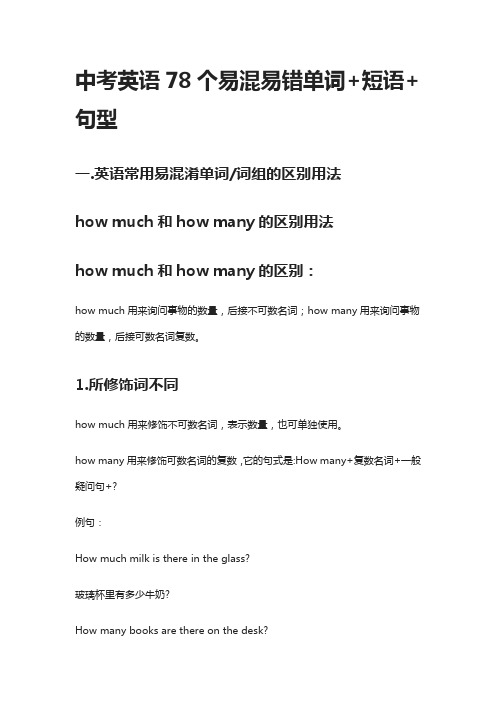
中考英语78个易混易错单词+短语+句型一.英语常用易混淆单词/词组的区别用法how much和how many的区别用法how much和how many的区别:how much用来询问事物的数量,后接不可数名词;how many用来询问事物的数量,后接可数名词复数。
1.所修饰词不同how much用来修饰不可数名词,表示数量,也可单独使用。
how many用来修饰可数名词的复数,它的句式是:How many+复数名词+一般疑问句+?例句:How much milk is there in the glass?玻璃杯里有多少牛奶?How many books are there on the desk?有多少本书在桌子上?2.用法不同How much 表示多少钱,用来问价格。
例句:How much is this dress?这个连衣裙多少钱?How many 表示多少,用来问数量。
例句:How many apples do you have?你有多少苹果?in和on的区别用法:当我们表示某些东西被其他东西所包围时使用“in”这个词。
而“on”用于描述物体被放置在其他物体上方或外部的情况。
in可表时间,表地点,表手段、方法、材料。
on表示时间、地点、方位等。
1.意思不同in:prep.在 ... 里;在 ... 地方;在 ... 期间on:prep.在 ... 之上2.用法不同in:in着重一段时间的过程,常用于重复动作或延续动作。
in表示从现在时间算起推移到将来的一段时间之后,一般与将来时态连用。
He is a layman in economics.他对经济学一窍不通。
on:表示“在物体的表面上”,只能用on的表达方式有on the next morning,on the following。
The spider is walking on the ceiling.蜘蛛在天花板上爬行。
3.侧重点不同in:表示“在其中”。
[全]人教版七八九年级英语常考易混短语
![[全]人教版七八九年级英语常考易混短语](https://img.taocdn.com/s3/m/768d12910722192e4436f654.png)
人教版七八九年级英语常考易混短语一.make的短语1. make friends 结交朋友2. make a wish 许愿3. make (one’s)bed 铺床4. Make up 编造故事,编造谎言5. Make sure 确保,查明6.Make promises 许诺7.Make (a lot of ) money 赚许多钱8.Make mistakes 犯错误9.Make a difference 影响,起作用10.make one’s way 前进;费力地前进11.make one’s own decision 自己做决定12.make an effort 做出努力13.make......feel at home 使某人感到宾至如归14.make a mess 弄得一团糟(一塌糊涂)二.take1. take a shower 洗淋浴2.take a walk 散步;走一走3.take the train/bus 乘火车/公共汽车4.take a message 捎个口信,传话5.take a photo of 给。
照相6. take one’s order 点菜7.Take ......seriously 认真对待8.Take sb’s place 代替,替换9.Take up (尤指为消遣)学着做,开始做10.Take out 拿出,带出11.Take a trip 去旅行12.Take one’s temperature 量体温13.Take breaks (take a break) 休息14.Take risks(take a risk) 冒险15.Take after (外貌或行为)像16.take out the rubbish 倒垃圾17.Take care of 照顾,处理18.take in 吸入,吞入(体内)19.take down 拆除,往下拽,记录20.take notes 记笔记21.take pride in 为。
中考英语重点易混淆短语总结精华(推荐)
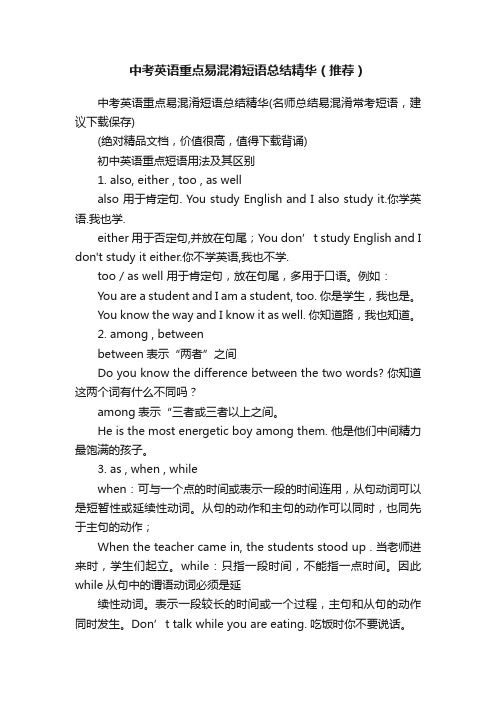
中考英语重点易混淆短语总结精华(推荐)中考英语重点易混淆短语总结精华(名师总结易混淆常考短语,建议下载保存)(绝对精品文档,价值很高,值得下载背诵)初中英语重点短语用法及其区别1. also, either , too , as wellalso 用于肯定句. You study English and I also study it.你学英语.我也学.either 用于否定句,并放在句尾;You don’t study English and I don't study it either.你不学英语,我也不学.too / as well 用于肯定句,放在句尾,多用于口语。
例如:You are a student and I am a student, too. 你是学生,我也是。
You know the way and I know it as well. 你知道路,我也知道。
2. among , betweenbetween表示“两者”之间Do you know the difference between the two words? 你知道这两个词有什么不同吗?among表示“三者或三者以上之间。
He is the most energetic boy among them. 他是他们中间精力最饱满的孩子。
3. as , when , whilewhen:可与一个点的时间或表示一段的时间连用,从句动词可以是短暂性或延续性动词。
从句的动作和主句的动作可以同时,也同先于主句的动作;When the teacher came in, the students stood up . 当老师进来时,学生们起立。
while:只指一段时间,不能指一点时间。
因此while从句中的谓语动词必须是延续性动词。
表示一段较长的时间或一个过程,主句和从句的动作同时发生。
Don’t talk while you are eating. 吃饭时你不要说话。
中考易混淆单词
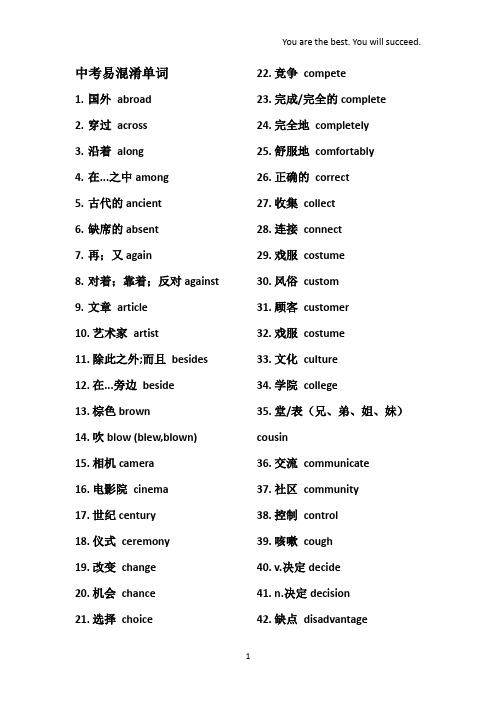
You are the best. You will succeed.中考易混淆单词1.国外abroad2.穿过across3.沿着along4.在...之中among5.古代的ancient6.缺席的absent7.再;又again8.对着;靠着;反对against9.文章article10.艺术家artist11.除此之外;而且besides12.在...旁边beside13.棕色brown14.吹blow (blew,blown)15.相机camera16.电影院cinema17.世纪century18.仪式ceremony19.改变change20.机会chance21.选择choice 22.竞争compete23.完成/完全的complete24.完全地completely25.舒服地comfortably26.正确的correct27.收集collect28.连接connect29.戏服costume30.风俗custom31.顾客customer32.戏服costume33.文化culture34.学院college35.堂/表(兄、弟、姐、妹)cousin36.交流communicate37.社区community38.控制control39.咳嗽cough40.v.决定decide41.n.决定decision42.缺点disadvantageYou are the best. You will succeed.43.挖dig(dug, dug)44.邀请invite45.发明invent46.邀请invitation47.发明invention48.分开divide49.电electricity50.电的electric51.电子的elcetronic52.实验experiment53.经验;经历experience54.尤其;特别especially55.确切地exactly56.极好的;优秀的excellent57.除了except58.期望expect59.表达express60.表现behave61.表扬perform62.渔夫fisherman63.第四fourth64.十四fourteen 65.第四十fortieth66.法语/法国人的French67.法国France68.外国人foreigner69.花园garden70.地理geography71.毕业graduate72.逐渐地gradually73.大体的general74.客人guest75.门卫;士兵guard76.导游guide77.德语/德国人的German78.德国Germany79.习惯habit80.爱好hobby81.幽默的humorous82.高度height83.重量weight84.加热heat85.心脏heart86.拥抱hug(hugged,hugged)87.隐藏hide(hid,hidden)88.放;下(蛋)lay( laid, laid)89.躺lie (lay, lain)90.撒谎(lied,lied)91.邀请invite92.发明invent93.产业;工业industry94.面试;采访interview95.介绍introduction96.指示;指令instruction97.立刻immediately98.日语/日本人的Japanese99.模型model100.中间的middle101.嘴巴mouth102.月month103.老鼠mouse104.钱money105.猴子monkey106.奖牌medal107.铁的metal108.精神上的mental 109.医学的medical110.药medicine111.机器machine112.材料material113.第九ninth114.九十ninety115.(两者)都不neither 116.(三者以上)都不none 117.第九十ninetieth 118.乘客passenger119.段落/走廊passage 120.合适地properly121.可能地possibly122.可能地probably123.承诺promise124.产品product125.英镑pound126.骄傲的proud127.骄傲n. pride128.小学生pupil129.紫色purple130.价格price131.奖品prize132.表扬;赞扬praise 133.星球planet134.种植/植物plant 135.荣幸;快乐pleasure 136.完美的perfect 137.耐心的patient 138.有礼貌的polite 139.飞行员pilot140.准备prepare 141.更喜欢prefer 142.预防prevent 143.保护protect144.污染pollute145.生产v. produce 146.过程n.process 147.十分quite148.安静的quiet 149.收到receive150.意识到realize 151.提醒remind152.复习,回顾review 153.害怕的(形容人)scared 154.害怕的(形容物)scary 155.酸的sour156.咸的salty157.糖sugar158.卖;销售n.sale159.卖;销售V.sell160.v.服务serve161.n.服务service162.n.仆人servant163.围巾scarf164.分离separate165.小吃,零食snack 166.蛇snake167.标准standard168.严格的strict169.严肃的,认真的serious 170.象征symbol171.标志sign172.社会society173.社会的social174.偷steal(stole, stolen)175.摇晃shake(shook,shaken) 176.传播spread177.速度speed178.猜想;设想suppose 179.支持support180.建议suggest181.成功v.succeed182.成功n.success183.通过through184.虽然though/although 185.扔throw (threw, thrown) 186.周二Tuesday187.周四Thursday188.十三thirteen189.三十thirty190.十二twelve191.第十二twelfth192.朝;向toward(s)=to 193.向前forward194.厕所toilet195.珍宝treasure196.雨伞umbrella 197.大学university 198.参观者visitor 199.视频;录像video 200.周三Wednesday 201.天气weather 202.是否whether。
中考初中英语易混易错词汇总结

中考初中英语易混易错词汇总结第一部分:易用错的词1. clothes, cloth, clothingclothes统指各种衣服,谓语动词永远是复数,cloth指布,为不可数名词clothing服装的总称,指一件衣服用a piece of, an article of2. amount, numberamount后接不可数名词,number后接可数名词a number of students3. family, house, homehome家,包括住处和家人,house房子,住宅,family家庭成员. My family is a happy one.4. sound, voice, noisesound自然界各种各样的声音,voice人的嗓音,noise噪音I hate the loud noise outside.5. photo, picture, drawingphoto用照相机拍摄的照片,picture可指相片,图片,电影片,drawing画的画Let's go and see a good picture.6. vocabulary, wordvocabulary词汇,一个人拥有的单词量,word具体的单词He has a large vocabulary.7. population, peoplepopulation人口,人数,people具体的人China has a large population.8. road, street, path, wayroad具体的公路,马路,street街道,path小路,小径,way道路,途径take this road; in the street, show me the way to the museum.9. course, subjectcourse课程(可包括多门科目),subject科目(具体的学科)a summer course10. custom, habitcustom传统风俗,习俗,也可指生活习惯,后接to do,habit生活习惯,习惯成自然,后接of doing. I've got the habit of drinking a lot.11. cause, reasoncause指造成某一事实或现象的直接原因,后接of sth./doing sth,reason用来解释某种现象或结果的理由,后接for sth./doing sth. the reason for being late12. exercise, exercises, practiceexercise运动,锻炼(不可数),exercises练习(可数),practice(反复做的)练习Practice makes perfect.13. class, lesson作"课"解时,两者可以替换.指课文用lesson.指班级或全体学生用class. lesson 6; class 5 14. speech, talk, lecturespeech指在公共场所所做的经过准备的较正式的演说,talk日常生活中的一般的谈话,讲话,lecture学术性的演讲,讲课 a series of lecture on…15. officer, officialofficer部队的军官,official政府官员an army officer16. work, job二者均指工作。
202X年中考英语78个易混易错单词+短语+句型
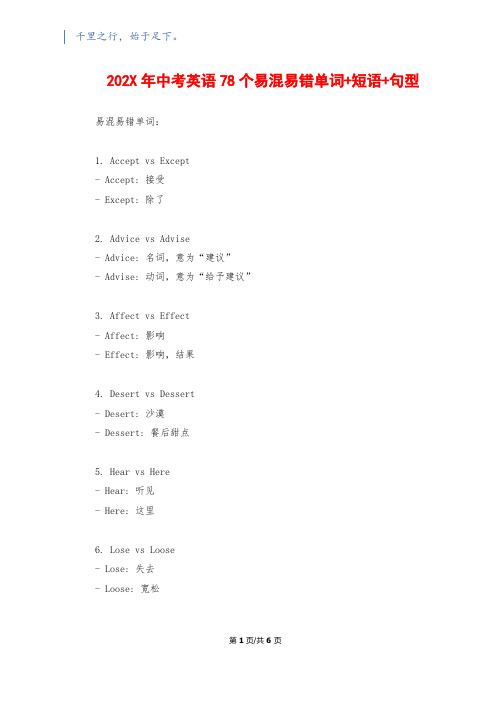
202X年中考英语78个易混易错单词+短语+句型易混易错单词:1. Accept vs Except- Accept: 接受- Except: 除了2. Advice vs Advise- Advice: 名词,意为“建议”- Advise: 动词,意为“给予建议”3. Affect vs Effect- Affect: 影响- Effect: 影响,结果4. Desert vs Dessert- Desert: 沙漠- Dessert: 餐后甜点5. Hear vs Here- Hear: 听见- Here: 这里6. Lose vs Loose- Lose: 失去- Loose: 宽松第1页/共6页7. Weather vs Whether- Weather: 天气- Whether: 是否8. Quiet vs Quite- Quiet: 安静- Quite: 相当9. Principal vs Principle- Principal: 校长- Principle: 原则10. Stationary vs Stationery - Stationary: 静止的- Stationery: 文具11. Than vs Then- Than: 比如- Then: 然后12. Their vs There vs They're - Their: 他们的- There: 那里- They're: they are(他们是)13. Threw vs Through- Threw: 扔- Through: 穿过14. To vs Too- Too: 也,过于15. Its vs It's- Its: 它的- It's: it is(它是)16. Your vs You're- Your: 你的- You're: you are(你是)17. Principal vs Principle- Principal: 校长- Principle: 原则18. Heel vs Heal- Heel: 脚后跟- Heal: 治愈19. Cement vs Concrete- Cement: 水泥- Concrete: 混凝土20. Idle vs Idol- Idle: 闲置的- Idol: 偶像21. Cell vs Sell- Cell: 细胞第3页/共6页22. Fare vs Fair- Fare: 费用- Fair: 公平的23. Foul vs Fowl- Foul: 犯规的- Fowl: 家禽24. Peak vs Peek vs Pique- Peak: 顶峰- Peek: 偷看- Pique: 激怒25. Breath vs Breathe- Breath: 呼吸(名词)- Breathe: 呼吸(动词)易混易错短语:1. By the way vs Anyway- By the way: 顺便问一下- Anyway: 无论如何2. In the meantime vs Meanwhile- In the meantime: 与此同时- Meanwhile: 与此同时3. On the other hand vs On the one hand- On the other hand: 另一方面- On the one hand: 一方面4. It's all Greek to me- 意为“对我来说这都是希腊文”,表示完全听不懂5. Fit as a fiddle- 意为“身体非常健康”6. Break a leg- 意为“祝你好运”7. A piece of cake- 意为“易如反掌”8. Once in a blue moon- 意为“千载难逢”9. Bite the bullet- 意为“咬紧牙关”10. Keep your fingers crossed- 意为“祝你好运”易混易错句型:1. I have been to New York last year.- I went to New York last year.第5页/共6页2. She didn't went to school yesterday.- She didn't go to school yesterday.3. Have you ever been to Paris?- Have you ever been to Paris before?4. I don't know nothing about that.- I don't know anything about that.5. He was tired, so he gone to bed early. - He was tired, so he went to bed early.6. I have lived in this city since 5 years. - I have lived in this city for 5 years.7. I am here for visit my grandparents.- I am here to visit my grandparents.8. We don't have no time for that.- We don't have any time for that.。
人教版九年级全册英语易错单词大汇总及练习(含答案)(背诵版+默写版)

初三英语易错单词大汇总(背诵版)1.except (除了)2.expect (期待)3.expert (专家)4.accept(接受)1.beside(旁边)2.besides (除此之外)1.quiet(安静)2.quite (十分,非常)1.catch-caught (抓住)2.teach-taught (教)1.true—truly (真的的)fortable—comfortably(舒服的)3.terrible---terribly (可怕的)1.polite---politely(有礼貌的) impolite (没礼貌)plete—completely(完全的)1.nine—nineteen(十九)---ninety(九十)----ninth(第九)2.four---fourteen(十四)----forty (四十)1.twelve---twelfth (十二)2.twenty---twentieth (二十)1.garden (花园) 2.pardon (请原谅,再说一遍)e true (实现)2.in the future (在未来)1.desert (沙漠)2.dessert (甜品)1.habit (习惯)2.hobby(兴趣)1.hundred (百)2.thousand (千)lion(百万)4.billion(十亿)1.friend (朋友)2.foreign (外国的)3.field (田野)1.invent(发明)2.invite (邀请)1.dollar (美元)2.similar (相似)3.familiar(相似)1.though = although (尽管)2.through (通过)3.thought(think的过去式)1.throw ---threw---thrown (扔)2.lie----lay----lain(躺,位于)3.lie---lied ---lied(说谎)y ---laid----laid (放,产卵)1.till (直到)2.not-----until(直到-----才)3.unless (除非)1.argue(争吵,动词)---argument(争吵,名词)1.delicious (美味的)2.travel (旅行)3.thief--thieves (小偷)1.one---first (第一)2.three –third (第三)3.girls (女孩)1.mouth(嘴巴)2.month----months (月份)3.mouse—mice (老鼠) 1.plan---planned (双写)2.prefer----preferred (双写)3.stop-stopped(双写)1.eat---eating(不双写)2.rain---raining(不双写)3.wait-waiting(不双写)4.happen----happened 、happening(不双写)5.write-wrote-written(双写)-writing(不双写)1.expensive----inexpensive2.like ---dislike(不喜欢) ----unlike(不像)1.honest---dishonest(不诚实)2.appear---disappear(消失)1. modern (现代化的)2.model(模型)1.medicine (药)2.machine(机器)1.pride (骄傲,名词)2.proud (自豪的,形容词)3.pound (英镑)1.weather (天气)2.whether(是否)1.father(父亲)2.farther (far的比较级,更远的)3.further(进一步,更深入)1.believe (相信)2.receive (收到)1. succeed (成功,动词)-----success(名词)-successful(形容词) 1.before (之前)2.pass (动词通过)3.past(介词,经过一般用于动词后,如:walk past)初三英语易错单词大汇总(默写版)1_________ (除了)2.__________(期待)3. _________(专家)4. _________(接受)1. _________(旁边)2. _________ (除此之外)1. _________(安静)2. _________ (十分,非常)1.catch-_________ 过去式(抓住)2.teach-_________过去式(教)1.true—_________ 副词(真的)fortable—_________(舒服的)3.terrible---_________ (可怕的)1.polite--_________ (有礼貌的) _________ (没礼貌)plete—_________(完全的)1.nine—_________ (十九)-- _________(九十)--_________ (第九)2.four--_________ (十四)-- _________(四十)1.twelve---_________(十二)2.twenty---_________ (二十)1. _________ (花园)2. _________(请原谅,再说一遍)e _________ (实现)2.in the_________ (在未来)1. _________ (沙漠)2. _________(甜品)1. _________ (习惯)2. _________(兴趣)1. _________ (百)2. _________(千)3. _________(百万)4. _________(十亿)1. _________ (朋友)2. _________(外国的)3. _________(田野)1. _________(发明)2. _________(邀请)1. _________(美元)2. _________(相似)3. _________(相似)1. _________ = _________(尽管)2. _________(通过)3. _________(think的过去式)1.throw --________ --________ (扔)2.lie---_______ -______ (躺,位于)3. lie--______ --______(说谎)y --________ --________(放,产卵)1. _________ (直到)2._________(直到-----才)3. _________(除非)1. _________(争吵,动词)---_________争吵,名词)1. _________ (美味的)2. _________ (旅行)3.thief--_________ (小偷)1.one--_________ (第一)2.three –_________ (第三)3. _________(女孩)1. _________ (嘴巴)2.month---_________ (月份)3.mouse—_________ (老鼠)1.plan---_________ 过去式(双写)2.prefer----_________(双写)3.stop-_________(双写)1.eat--_________现在分词(不双写)2.rain---_________(不双写)3.wait-_________(不双写)4.happen----_________、_________(不双写)1.expensive----________(不贵的)2.like --________ (不喜欢) ----________(不像)1.honest---________(不诚实)2.appear---________ (消失)1. ________(现代化的)2. ________(模型)1. ________ (药)2. ________(机器)1. ________(骄傲,名词)2. ________(自豪的,形容词)3. ________(英镑)1. ________(天气)2. ________(是否)1. ________(父亲)2. ________(far的比较级,更远的)3.________(far的比较级,进一步,更深入)1. ________(相信)2. ________(收到)1. ________ (成功,动词)--- ________(名词)-________ (形容词)1. ________(之前)2. ________ (动词通过)3. ________(介词,经过,一般用于动词后,如:______走过)易错首字母强化训练:1.There are many different kinds of flowers in the g_________.2.Our parents t_________ care for us. They always prepare everything what we need in advance.3.I took lots of wonderful photos with my new c__________.4.E__________ is the mother of wisdom.5.A__________speaks louder than words.6.I beg your ________. What do you mean7.There are so many things around us that go against our w________. We should believe in ourselves and keep on fighting.8.You are supposed to fini sh your homework b________ ten o’clock.9.I used to sit b_________ my mother and enjoyed the stories when I was young.10.Mary can speak three f_________ languages, such as Chinese, French, and German.11.I can’t stand the w________ here, it’s so hot and h umid.12.You’d better change your bad eating h__________. Don’t eat too much fat.13.Today is my t____________ birthday. So eleven candles is not enough , I still need one more.14.The thief was c___________ by the police three years later. And put him into the prison.15.Look , the students are w__________ for the bus. The bus was fiveminutes later than usual.16.Please show me the m_______ plane, It’s quite special, I’m really interested in it.17.My grandma began to learn English in her f________---nearly fifty years old.18.I p_________to go Hongkong for my holiday, but now I have changed my mind. I will go to Thailand instead.19.There are f_______ days in two weeks.20.The people who have realized their mistakes should be e________. 参考答案:1.garden2.truly3.camera4.Experience5.Action6.pardon7.will 8.by/before 9.beside 10.foreign 11.weather 12.habit13.twelfth 14.caught 15.waiting 16.model 17.forties 18.planned 19.fourteen 20.excused。
人教部编版初中英语中考78个易混易错单词短语句型梳理
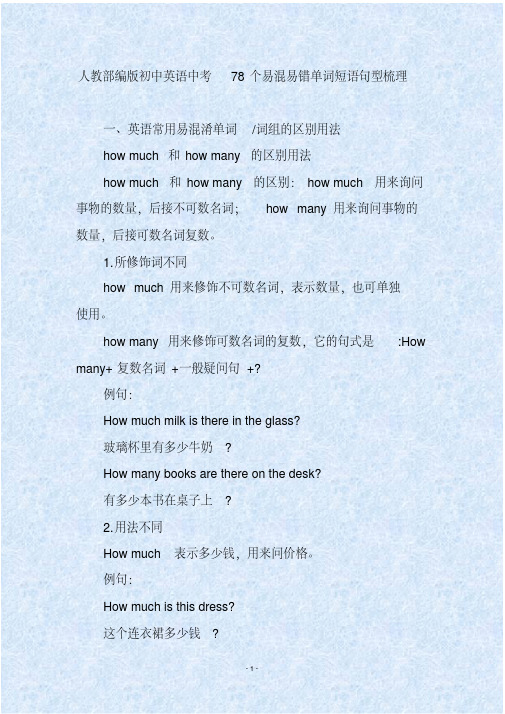
人教部编版初中英语中考78个易混易错单词短语句型梳理一、英语常用易混淆单词/词组的区别用法how much和how many的区别用法how much和how many的区别:how much用来询问事物的数量,后接不可数名词;how many用来询问事物的数量,后接可数名词复数。
1.所修饰词不同how much用来修饰不可数名词,表示数量,也可单独使用。
how many用来修饰可数名词的复数,它的句式是:How many+复数名词+一般疑问句+?例句:How much milk is there in the glass?玻璃杯里有多少牛奶?How many books are there on the desk?有多少本书在桌子上?2.用法不同How much 表示多少钱,用来问价格。
例句:How much is this dress?这个连衣裙多少钱?How many 表示多少,用来问数量。
例句:How many apples do you have?你有多少苹果?in和on的区别用法当我们表示某些东西被其他东西所包围时使用“in”这个词。
而“on”用于描述物体被放置在其他物体上方或外部的情况。
in可表时间,表地点,表手段、方法、材料。
on表示时间、地点、方位等。
1.意思不同in:prep.在 ... 里;在 ... 地方;在 ... 期间on:prep.在 ... 之上2.用法不同in:in着重一段时间的过程,常用于重复动作或延续动作。
in表示从现在时间算起推移到将来的一段时间之后,一般与将来时态连用。
例句:He is a layman in economics.他对经济学一窍不通。
on:表示“在物体的表面上”,只能用on的表达方式有on the next morning,on the following。
例句:The spider is walking on the ceiling.蜘蛛在天花板上爬行。
- 1、下载文档前请自行甄别文档内容的完整性,平台不提供额外的编辑、内容补充、找答案等附加服务。
- 2、"仅部分预览"的文档,不可在线预览部分如存在完整性等问题,可反馈申请退款(可完整预览的文档不适用该条件!)。
- 3、如文档侵犯您的权益,请联系客服反馈,我们会尽快为您处理(人工客服工作时间:9:00-18:30)。
中考英语78个易混易错单词、短语01英语常用易混淆单词/词组的区别用法how much和how many的区别用法how much和how many的区别:how much用来询问事物的数量,后接不可数名词;how many用来询问事物的数量,后接可数名词复数。
1.所修饰词不同how much用来修饰不可数名词,表示数量,也可单独使用。
how many用来修饰可数名词的复数,它的句式是:How many+复数名词+一般疑问句+?例句:How much milk is there in the glass?玻璃杯里有多少牛奶?How many books are there on the desk?有多少本书在桌子上?2.用法不同How much 表示多少钱,用来问价格。
例句:How much is this dress?这个连衣裙多少钱?How many 表示多少,用来问数量。
例句:How many apples do you have?你有多少苹果?in和on的区别用法当我们表示某些东西被其他东西所包围时使用“in”这个词。
而“on”用于描述物体被放置在其他物体上方或外部的情况。
in可表时间,表地点,表手段、方法、材料。
on表示时间、地点、方位等。
1.意思不同in:prep.在 ... 里;在 ... 地方;在 ... 期间on:prep.在 ... 之上2.用法不同in:in着重一段时间的过程,常用于重复动作或延续动作。
in表示从现在时间算起推移到将来的一段时间之后,一般与将来时态连用。
例句:He is a layman in economics.他对经济学一窍不通。
on:表示“在物体的表面上”,只能用on的表达方式有on the next morning,on the following。
例句:The spider is walking on the ceiling.蜘蛛在天花板上爬行。
3.侧重点不同in:表示“在其中”。
on:表示“在表面”。
if和whether的区别用法if和whether的区别:if和whether在宾语从句中,都表“是否”,可换用,if更口语化,whether正式些。
当有or not时,一般用whether,而不用if。
1.or not放在whether之后时,只能用whether不用if。
例句:I don’t know whether or not he will come.我不知道他是不是回来。
注:如果or not放在whether所引导的从句句尾,则可以用if来替换。
I don’t know whether/if he will come or not.我不知道他是不是回来。
2.在强调任意选择时,用whether…or,此时不用if替换whether。
例句:He asked me whether I wanted to go there by train or by bus.他问我是想乘火车还是坐公共汽车去那里。
注:whether和or一起还有“不管”之意,引导让步状语从句。
Whether he drives or takes the train, he will be here on time.不管开车来还是乘火车来,他都会准时到。
3.虽引导宾语从句,但为了强调宾语部分,也可把从句放在句首,此时只用whether不用if。
例句:Whether he will come I am not sure.他是不是来我拿不准。
4.从句作介词宾语时只用whether不用if。
例句:It depends on whether it will be fine.那得看是不是晴天。
5.作discuss等动词的宾语时,用whether不用if。
例句:We discussed whether we should close the shop.我们讨论是不是该关掉商店。
6.句子中有if引导的条件句,如再有表示“是否”的宾语从句,用whether不用if。
例句:He asked me whether I’d move to New York if I got the job.他问我如果我得到那份工作是否会搬家到纽约。
7.容易产生歧义时用whether不用if来表示“是否”。
例句:Please let me know if you need help.如果你需要帮助请告诉我。
8.如果宾语从句为否定句时,则只用if不用whether。
例句:I don’t know if it won't rain tomorrow..我不知道明天是不是会下雨。
or和and的区别用法并列结构中,or通常用于否定句,and用于肯定句。
但有时and也可用于否定句。
or用于连接并列的单词、词组、短语或句子,表示'或者'的意思。
or用在选择疑问句中,灵活译为'还是'。
1.or和and有什么区别(1)并列结构中,and用于肯定句,or通常用于否定句表示“和,与”的意思。
Sue and I left early.我和苏早离开了。
He can't read or write.他不会读,不会写。
(2)or用在选择疑问句中,意为“或者,还是”。
and不可用于疑问句。
Are you coming or not?你来还是不来?Is your sister older or younger than you?你的姐妹比你大还是小?(3)固定搭配不同or在句型“祈使句+or+陈述句”中,表示在以祈使句为条件下的相反假设,or意为“否则,要不然”。
either…or意思为'或者……或者……'。
注意谓语动词的主谓一致采用就近原则。
2.and和or用法例句(1)并列结构中,and用于肯定句,or通常用于否定句表示“和,与”之意。
There are some students and teachers on the playground.(2)or用在选择疑问句中,意为“或者,还是”。
Is he a doctor or a teacher? 他是医生还是教师?(3)or在句型“祈使句+or+陈述句”中,表示在以祈使句为条件下的相反假设,or意为“否则,要不然”。
Work hard,or you will fall behind.你要努力学习,否则会落后。
(4)either…or意思为'或者……或者……'。
注意谓语动词的主谓一致采用就近原则。
Either you or I am right. 不是你对,就是我对。
(5)or在“either…or…”结构中,意为“要么……要么……”。
连结的并列成份可在句中作主语、表语、谓语、宾语等。
(6)or表示不确切、模糊的陈述。
This story happened five or six years ago. 这个故事发生在四、五年前。
some和any的区别用法some和any的区别:肯定句中用some,否定/疑问要用any换some和any的用法1.some和any都表示一些,两者既可以修饰可数名词又可以修饰不可数名词。
前者用于肯定陈述及委婉请求,后者用于否定句及一般疑问句。
例句:I have some books.I don't have any books.Would you like some coffee?Is there any coffee in your cup?2.在表示建议,反问,请求的疑问句中,或期望得到肯定回答时,多用some而不用any。
例句:Would you like some coffee?What about some fruit juice?3.当说话人认为对方的答复将是肯定的时候,some便可用于疑问句。
例句:Didn't you give him some ticket4.当any表示“任何”的意思,起强调作用时,它可以用在肯定句中。
例句:Any student can answer this question.5.any可以和not以外其他有否定含义的词连用,表达否定的概念。
例句:He never had any regular schooling.I can answer your question without any hesitation.offer与provide的区别用法offer:主动提供;重点在于主动;offer to do:主动做某事。
搭配:offer sb. sth./ offer sth. to sb.provide:大批量地提供。
搭配:provide sth. for sb./ provide sb. with sth.1.provide和offer的区别provide 用于表示无主动慷慨之意地为人或物提供需要或有用的东西,仅仅是出于某种责任,强调提供必须或有用的东西,尤其是生活用品。
常用于peovide sb with sth或provide sth for sb的固定搭配中。
offer表示主动提供服务、工作等。
常用于offer sb sth或offer sth to sb的固定搭配。
例如:offer help to sb 主动提出帮助某人;offer sba good salary给某人一个好工资。
2.provide和offer的用法首先在语义上,provide仅表示“提供”,而offer强调“主动提供”。
其次在语法和搭配上,offer后可跟双宾语,而provide后不可跟双宾语最后在搭配上,offer可组成词组offer sb. sth./offer sth. to sb.;provide可组成短语provide sb. with sth./provide sth. for sb.include和contain的区别用法include与contain两者均可表示“包含”,但有区别:include 的宾语只能是整体中的一部分或是其要素之一,而不能是所谈事物的全体或所有要素。
contain 表示“包含”,其实是指其内装有。
1.include与contain的区别两者均可表示“包含”,但有区别:(1)include的宾语只能是整体中的一部分或是其要素之一,而不能是所谈事物的全体或所有要素。
如:Does the bill include a tip? 账单包括小费在内吗?Five were killed, including a baby. 共有六人死亡,其中有一个婴儿。
(2)contain表示“包含”,其实是指其内装有,即指某种较大的东西内装有较小的东西,其宾语可以是整体的一部分,也可以是其全体。
